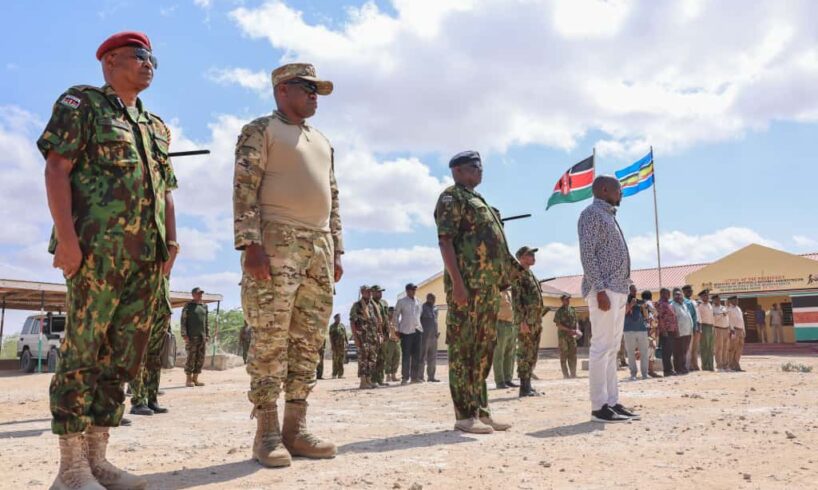
NAIROBI, Kenya, Oct 1 – The Jukwaa la Usalama grassroots engagement is finally coming to Nairobi, after being held in more than 40 counties.
The forums led by Interior Cabinet Secretary Kipchumba Murkomen are meant to map out key challenges respective areas are facing and more so on security.
Over the weeks, the CS while in the company of Kenya’s security bosses has listened to administrators and local leaders.
Some of the major problems emerging from across the country include issues of Gender Based Violence, teenage pregnancies, alcoholism and crime.
Murkomen says the goal is to understand the issues better and come up with a comprehensive approach to address them.
“The goal is to understand the issues better and come up with a comprehensive approach. Policing alone cannot solve these problems,” Murkomen told Nairobi residents, pledging tougher action alongside social interventions.
In past Jukwaa la Usalama forums, Murkomen has highlighted recurring themes across counties — from the menace of illicit alcohol and drug abuse to gender-based violence, teenage pregnancies, criminal gangs, and land-related conflicts.
He has stressed that while police operations are vital, enforcement alone cannot solve deep-rooted social problems.
“We cannot police our way out of these challenges,” Murkomen noted. “It requires a bigger societal conversation, mutual accountability, and reforms that give ordinary Kenyans the dignity and safety they deserve.”
The Nairobi meeting comes at a time when the capital has faced renewed insecurity, with residents raising alarm over a surge in violent robberies in estates and city streets early last month.
Several gangs were reported to be targeting commuters and businesses, forcing police to increase patrols in affected areas.
Murkomen has already issued a stern warning that political leaders accused of financing or protecting criminal groups will face prosecution.
“This is a civilised government. We will dismantle the gangs, go after their financiers, and hold accountable those who have been hiring them,” he said.
At the national level, the ministry has rolled out a 100-day Rapid Results Initiative to tackle second-generation alcohol and narcotics.
Murkomen has described the illicit alcohol trade as a national security threat, revealing that some senior government officials, police officers, and politicians are complicit.
“Any officer or politician found culpable will face arrest. Within the next 100 days, we will roll out a nationwide operation to ensure this menace is addressed once and for all,” he warned.
To lead this fight, the CS announced the formation of a special multi-agency unit combining officers from the National Police Service, NACADA, the Kenya Revenue Authority (KRA), and the Kenya Bureau of Standards (KEBS).
The team will conduct coordinated sting operations targeting rogue manufacturers, distributors, and smugglers.
He has also threatened to revoke the licenses of licensed manufacturers found adulterating alcohol.
Linked to the alcohol and drug crisis are rising cases of suicide, mental health struggles, and gender-based violence.
Murkomen has condemned attempts by local leaders to settle sexual offences through family negotiations, insisting that perpetrators must face the law.
“These are heinous crimes. They cannot be solved through family arrangements or traditional negotiations,” he said.
In addition to the fight against illicit substances, the government has intensified disarmament efforts.
Murkomen early last month declared a fresh two-week amnesty for individuals in possession of illegal firearms, particularly in violence-prone and bandit-hit regions, but also in urban centres where crime is on the rise.
“These guns have caused untold suffering through loss of lives, livestock and property. Those who defy this offer will face dire consequences. We are going to forcefully disarm you, profile you, summon you and seek you out,” he warned.
The CS revealed that Inspector General of Police Douglas Kanja has been tasked with rolling out intelligence-led operations to recover illegal weapons, including one used in the recent killing of an assistant chief in Migori.
He noted that while some progress has been made in the North Rift, where notorious bandits have surrendered firearms, more needs to be done to end the cycle of violence.
Murkomen has also used the forums to address the welfare of police officers, insisting that acknowledging their challenges should not be mistaken for condoning corruption.
He admitted that persistent fuel shortages have hampered operations, with allocations per vehicle running out before the end of the month.
“The reason police officers are asking for fuel is because it is the truth. By the 18th of every month, the allocation is usually depleted from trips to operation areas. Our officers deserve to be heard rather than mocked,” he said.
Proposals are underway to increase allocations, while the ministry also engages counties to address logistical issues such as water shortages in security camps.
In a gender-focused pledge, Murkomen has backed calls for maternity uniforms for expectant women in uniformed service, arguing that the lack of proper attire undermines their dignity.
“I was shocked to learn that female officers do not have maternity uniforms. When they become expectant, they are told to go on leave or wear civilian clothes. That is unacceptable,” he said.
The Nairobi edition of Jukwaa la Usalama is expected to put the spotlight on the city’s unique challenges — from organised gangs and illicit alcohol distribution to cybercrime and human trafficking.
Already, detectives have exposed a transnational trafficking syndicate that lured Kenyans with promises of lucrative jobs abroad, only to force them into combat roles in Russia’s war in Ukraine.
In recent raids in Athi River, 21 victims were rescued and a Russian national linked to the cartel arrested, highlighting the scale of international criminal networks operating through Nairobi.
As the capital prepares to host the forum, Murkomen has reiterated that the government’s mission is to confront insecurity from all fronts — through enforcement, reforms, and community partnership.
“This matter is about protecting our people,” he said. “We want every Kenyan child, woman and family to live in dignity and safety.”





